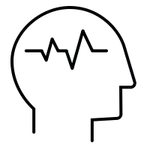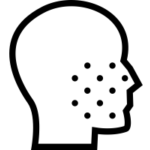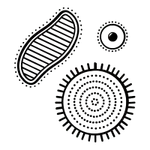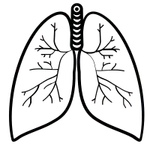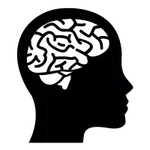Natural Menopause Clinic in Oakville:
Naturopathic Doctor at Oakville Natural Health Clinic is an excellent therapy option for women experiencing menopause-related symptoms of depression. Naturopaths use natural methods to address certain conditions, which are sometimes more effective than conventional treatments. Finally, they may be able to help you by suggesting supplements or therapies that are more appropriate for you.
Since the onset of menopause, many women have turned to naturopath for natural treatment options. Naturopaths believe that the body is a self-healing system and can heal itself if given the proper tools and support.
Naturopathic Doctor at Oakville Natural Health Clinic offers natural treatments for menopause and depression. Some of the treatments that a naturopath may prescribe for menopause include dietary changes, supplements, exercise, hormone therapy, and relaxation therapies. While there is no one-size-fits-all approach to managing menopause, naturopathic doctors typically emphasize personalized care and aim to help their patients feel as comfortable as possible during this challenging time.
In some cases, hormone therapy may also be recommended but should only be done under the supervision of a naturopathic doctor. Some of the most common naturopathic treatments for menopause include:
- Establishing a healthy diet and lifestyle: A healthy diet and lifestyle can help to improve overall health and reduce inflammation.
- Physical exercise: Exercise is an important part of maintaining a healthy lifestyle, and it can help to reduce stress and anxiety.
- Decrease alcohol consumption: Alcohol has been shown to increase the risk for heart disease, stroke, and diabetes, as well as for breast cancer.
- Increase vitamin and mineral intake: The average woman should take a multivitamin supplement every day.
- Take herbs or supplements: Some herbs and supplements may help to reduce the symptoms of menopause, including hot flashes, insomnia, mood swings, and vaginal dryness.
- Take estrogen supplements: Estrogen hormones, such as ethinyl estradiol, are taken by women to help maintain their menstrual cycle and prevent osteoporosis. These hormones are also taken by women after menopause to help treat symptoms of hot flashes and vaginal dryness.
- Reduce caffeine intake: Caffeine can increase the risk for heart disease and stroke.
- Eat a balanced diet: A diet that is high in fruits, vegetables, whole grains, and lean meat is recommended.
- Exercise regularly: Regular exercise can improve your mood and help ease symptoms of menopause.
- Avoid tobacco products: Tobacco use is the leading cause of preventable death.
- Get adequate sleep: Sleep is an important part of maintaining good health and can help ease symptoms of menopause.
- Manage stress: Stress can cause depression, anxiety, and other mood disorders that can affect your health.
- Manage medications: All medications can have side effects, which is why it is important to get your doctor’s approval before starting any new medication.
- Manage your weight: A healthy weight can help keep you at a healthy body mass index (BMI).
- Eat a balanced diet: A balanced diet helps support hormone production and other bodily functions that are important to overall health.
- Manage your menstrual cycle: A healthy menstrual cycle can help regulate hormone levels and ease symptoms of PMS.
- Eat a healthy diet: A healthy diet, rich in vitamins and antioxidants, helps the body maintain hormone levels.
Overview:
During menopause, the ovaries stop producing eggs. In most cases, the beginning occurs between the ages of 45 and 50, although it may occur earlier or later. Your mood may be affected by this relocation since you’ve had a difficult time coping with past life upheavals. In addition to women, menopause is a concern for males as well. As many as one in five of the world’s men suffer from depression, anxiety, and mood swings. Menopause occurs when a woman’s ovaries stop releasing eggs and she no longer has a period. According to the National Institutes of Health, the average age at which women experience menopause is 51. One out of every four women will experience depression at some point in their lives, according to the latest statistics. Even if no one reason is to blame, menopause’s altering hormones may lead to depression.
Two types of menopause exist:
- Menopause in a woman’s natural cycle
- amenorrhea a second time

Menopause in a woman’s natural cycle
Ovarian failure is the major cause of primary amenorrhea in women. Primary amenorrhea affects women of all ages. Heredity, thyroid problems, prolactin imbalances, PCOS and eating disorders may all induce primary amenorrhea. The underlying cause of the woman’s symptoms must be discovered and addressed as soon as feasible in order to guarantee a safe and successful pregnancy. Both surgical removal and cancer are possible causes of ovarian dysfunction in women.
Amenorrhea a second time
Secondary amenorrhea may develop in women who have had surgery, been injured, or have cancer. During a woman’s menstrual cycle, her ovaries stop generating eggs. Old age, illness, or radiation therapy are just a few of the many factors that might trigger menopause, which is the end of the woman’s menstrual cycle. Even though secondary amenorrhoea might go undetected for years, it is difficult to diagnose.
Menopause typically occurs around the age of 51 for most women. According to the US National Center for Health Statistics, 4.4 million women over 60 had non-pregnancy-related amenorrhea in 2011. (NCHS). Ovarian damage is the most common cause of secondary amenorrhea.
Male Menopause (Andropause):
Male menopause, also known as Andropause, is a similar process. When it comes to development, males go through the same phases as females, but at a different pace. Menopause may strike a woman at any point in her life cycle. There are several factors that might lead to menopause.
Predisposing variables, including as nutrition, activity, and genetics, may all contribute to the onset of menopause. It’s possible that poor eating habits in adolescence might hasten the onset of menopause. It is also possible that a hormonal imbalance is to blame for menopause. Reduced libido is one of several symptoms that may be caused by a drop in estrogen levels.
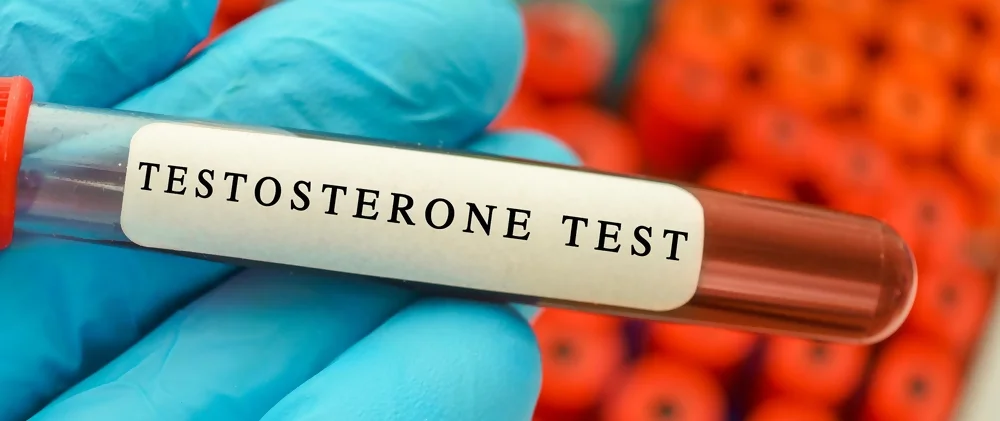
Having Postmenopausal Depression:
Depression is a common side effect of menopause. Menopausal depression affects a large percentage of women at some point in their lives. Some of the probable reasons include fluctuations in hormone levels, anxiety, or sleep deprivation.
All of these options are available to help alleviate depression after menopause. Most women go through menopause between the ages of 50 and 60. Women in their 40s and even earlier have been known to have it, although it is more frequent in women over 50. At 50 or 60, some women may start experiencing symptoms, although they are seldom serious enough to cause alarm until much later. The menopausal transition may be a challenging time in one’s life. It’s important to remember, however, that this stage of life is common for women and will eventually come to an end.
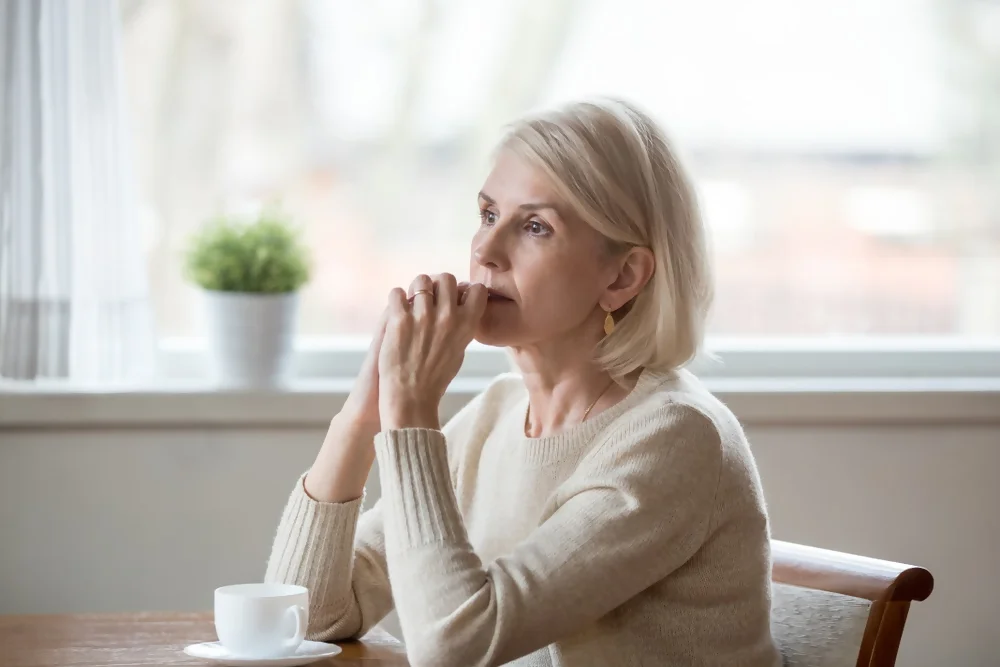
Symptoms:
When and how a woman goes through menopause varies greatly from woman to woman. The onset of menopause may be quick or gradual, depending on the individual woman.
Perimenopausal women are more likely to have some of these symptoms than males (the months and years leading up to menopause).
- Unregularly spaced intervals of time
- Inflammation in the genital area (vaginal atrophy)
- the absence of arousal (sex drive)
- Flashbacks
- Chills
- Sweltering in the middle of the night
- At night, there is a sense of danger.
- Mood swings are common.
- Exhaustion, gaining or losing weight, and a reduction in metabolic rate
- Dry scalp and thinning hair The reduction in breast size.
- Side effects and symptoms, such as weight loss and climacteric changes, are different for women. You’re more prone than the average woman to have menstrual irregularities.
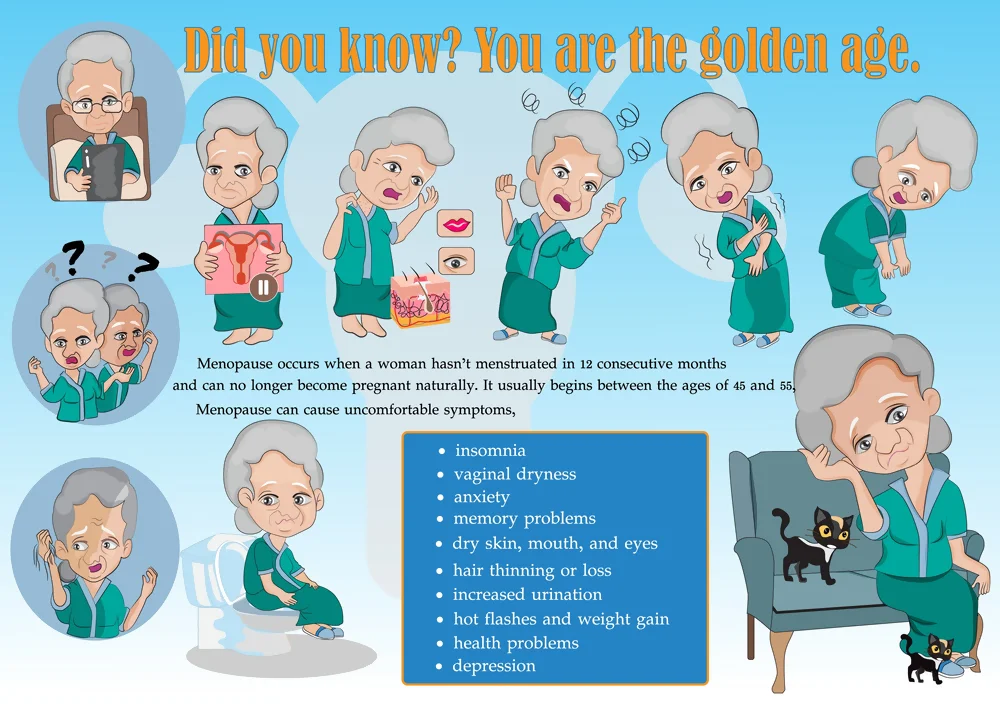
The perimenopause is to blame for women’s irregular menstrual periods. Most of the time, the cycle may be skipped for just a short period of time before resuming for many weeks or months. A period may occur more often or take a longer time. Pregnancy may occur despite a woman’s erratic menstrual cycles. Menstruation will be delayed during perimenopause. Before returning to a monthly cycle, an irregular menstrual cycle may last for up to two months. Even if your menstrual cycle is erratic and you’re not sure whether you’ve entered menopause, you may still be at danger. Consider taking a pregnancy test if you have missed your period but still have doubts.

If you have vaginal bleeding after menopause, visit a doctor right once. It is possible that a more serious problem is at hand, and more investigation is required. Seeing a doctor right away is extremely suggested if you have any kind of vaginal bleeding. As a result of hormonal changes, infections, and tumors, menopausal women may have vaginal bleeding.
Seeing your Naturopathic Doctor on a regular basis is essential to your overall health. Getting frequent checkups for your health and well-being is important, especially after menopause. Your Naturopathic Doctor may also suggest additional tests, such as a thyroid panel or a breast and/or pelvic exam.
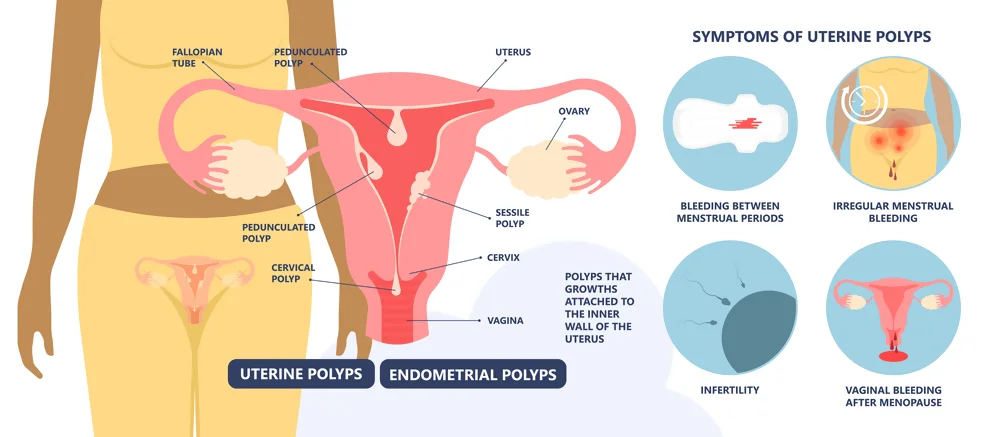
Causes:
Women go through menopause for many reasons.
There is a normal decline in the levels of reproductive hormones:
Lower levels of female reproductive hormones may trigger menopause in women, although this is true for both sexes. Estrogen production decreases in women’s ovaries throughout adolescence and the early years of adulthood. The drop in testosterone production in men is less pronounced than it is in women. For example, hot flashes, mood swings, fatigue, and dry vaginal discharge are all symptoms of menopause that affect both sexes, regardless of gender.
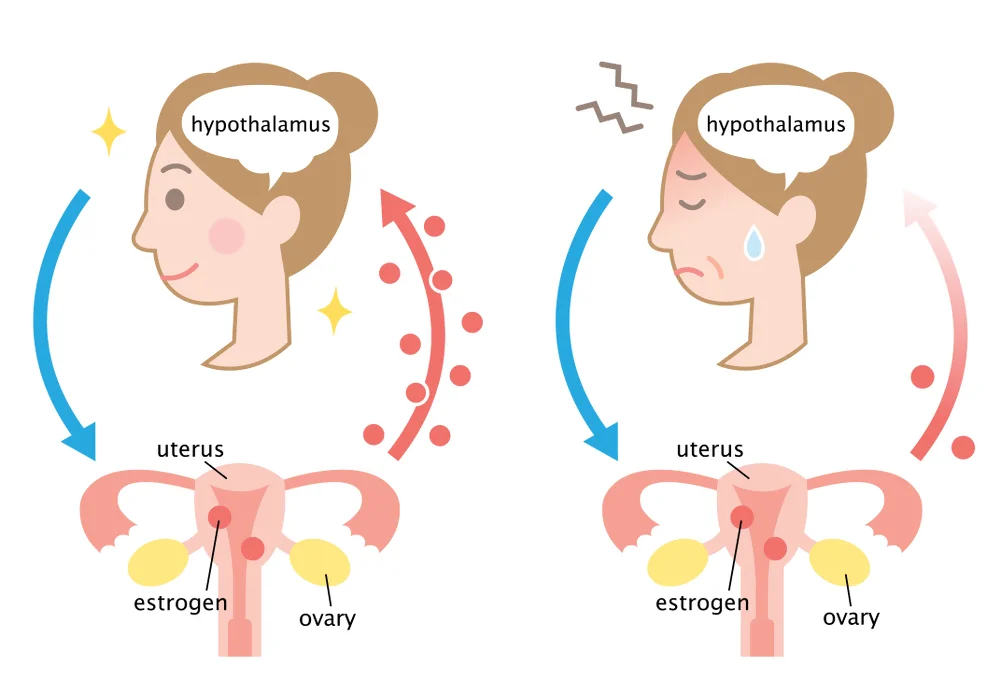
Ovaries are surgically removed:
Your ovaries create hormones that control your menstrual cycle. Your ovaries are surgically removed, causing you to go into menopause immediately. After the menstrual cycle has finished, it is common for women to experience hot flashes and other menopausal symptoms. Because of the severity of the symptoms that might result from abrupt rather than gradual changes in hormone levels. Before and after having your ovaries removed, see a Naturopathic doctor to make sure everything goes well.
Removal of the uterus, but not the ovaries, is known as Hysterectomy:
Menopause does not begin immediately after having a hysterectomy, which removes the uterus but leaves the ovaries in situ. No matter how often you go without a period, your ovaries are still working away at producing eggs, estrogen, and progesterone. Ovarian Cancer is still a possibility, for example.
Chemotherapy and radiation treatment:
Some cancer therapies might cause menopause-like symptoms, such as hot flashes, as a side effect. Since the cessation of menstrual cycles (and fertility) is not usually permanent, birth control may be essential after treatment. The therapy will have an effect if the ovaries are exposed to radiation. Therapy for menopause does not affect other parts of the body, such as the breasts, neck, or head.
POI: Primary Ovarian Insufficiency:
It is called primary ovarian insufficiency when the ovaries fail to produce enough eggs (POI). Depending on the woman’s age and reproductive history, symptoms may include infertility, irregular periods, and diminished sexual vigor. Genetic mutation or ovarian damage, illness, radiation therapy, and old age are all potential causes of POI. Therapy may help reduce some of the symptoms of POI, but there is yet no cure for the disease. Naturopathic physicians are well-versed in this subject and have access to treatments that other doctors may not have, as shown by several studies.
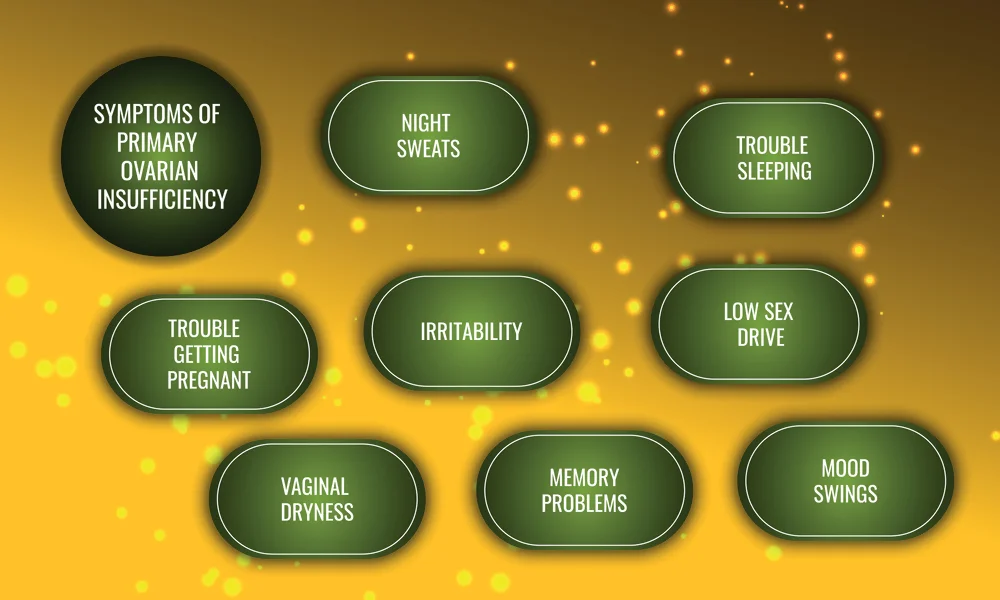
Complications:
Naturopathic doctors are increasingly treating the side effects of menopause. They have a greater success rate since naturopathic doctors focus natural treatment such as dietary changes as well as herbs and supplements and stress-reduction techniques. Naturopathic doctors often prescribe hormones and other medications, although they typically do so in conjunction with other treatments. With the help of a competent healthcare expert, the various and varied difficulties of menopause may be addressed. Hot flashes, vaginal dryness, mood swings, insomnia, and reduced libido are among the most prevalent symptoms. Women may be more susceptible to heart disease, stroke, osteoporosis, and dementia than men. Naturopathic doctors may be able to help restore the body’s natural functioning and thereby alleviate these problems.
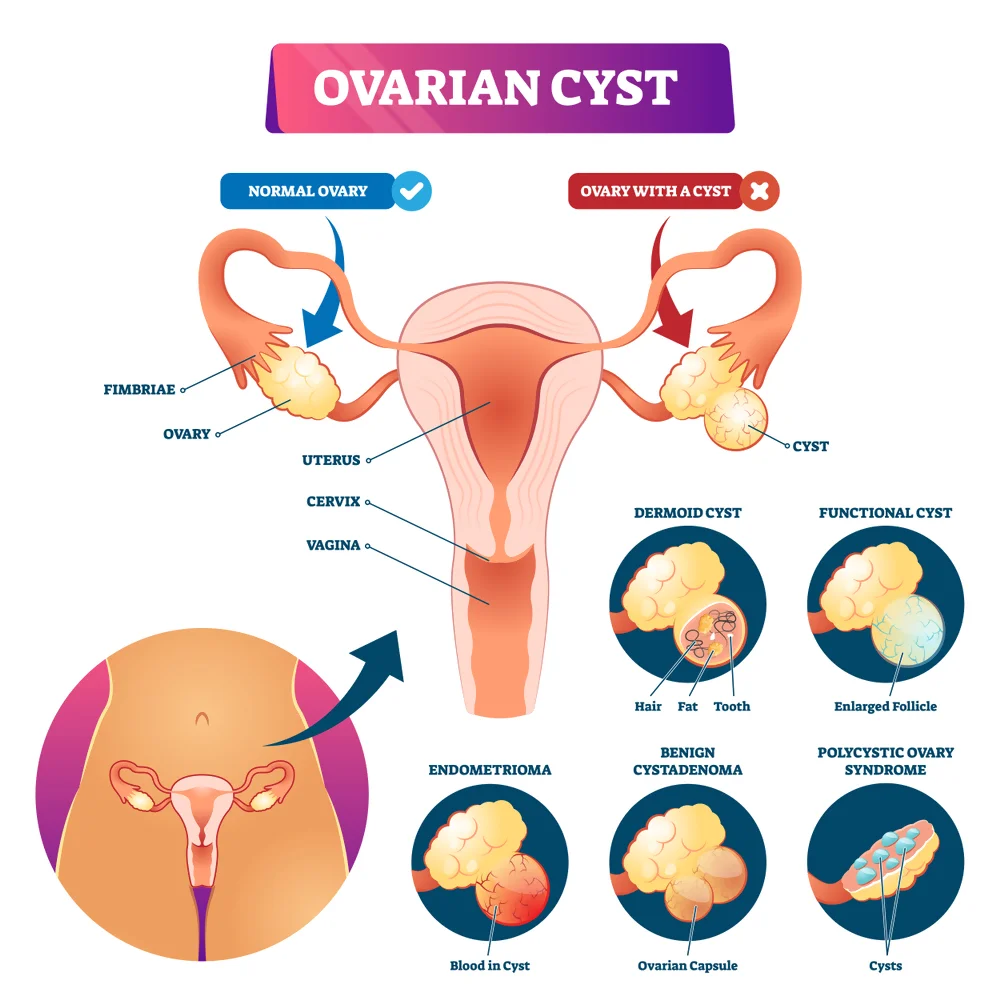
The heart and circulatory system:
Natural treatments are used by naturopathic doctors to treat health issues. Heart and blood vascular disorders are addressed here. To improve overall health, they may recommend supplements and dietary changes. Stroke and heart disease may be avoided in this manner, if implemented properly. naturopathic doctors may be able to detect and treat a variety of other health issues.
Osteoporosis:
Bones are more vulnerable to fracture if their density decreases. A naturopathic doctor may provide natural remedies to treat osteoporosis. Nutritional supplements, exercise, and dietary changes are just a few of the natural remedies naturopathic doctors use in order to help patients improve their bone health. Additionally, treatments like acupuncture and massage have been shown to reduce discomfort and improve blood flow to the bones and joints.
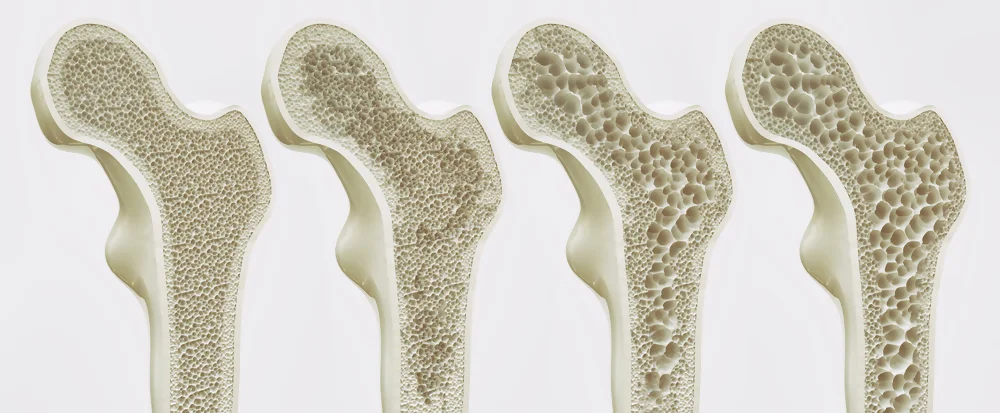
Urinary incontinence:
Given the prevalence of urinary incontinence, many patients turn to naturopathic doctors for treatment. Naturopathic doctors are trained to treat patients without the use of drugs. For those who are concerned about possible side effects or who believe that natural medicines are just as beneficial, this may be an option worth considering. Naturopathic doctors may provide other suggestions for improving urinary health than diet and exercise. Hormone treatment administered by naturopathic doctors may successfully cure menopausal urinary and vaginal problems that may lead to incontinence.
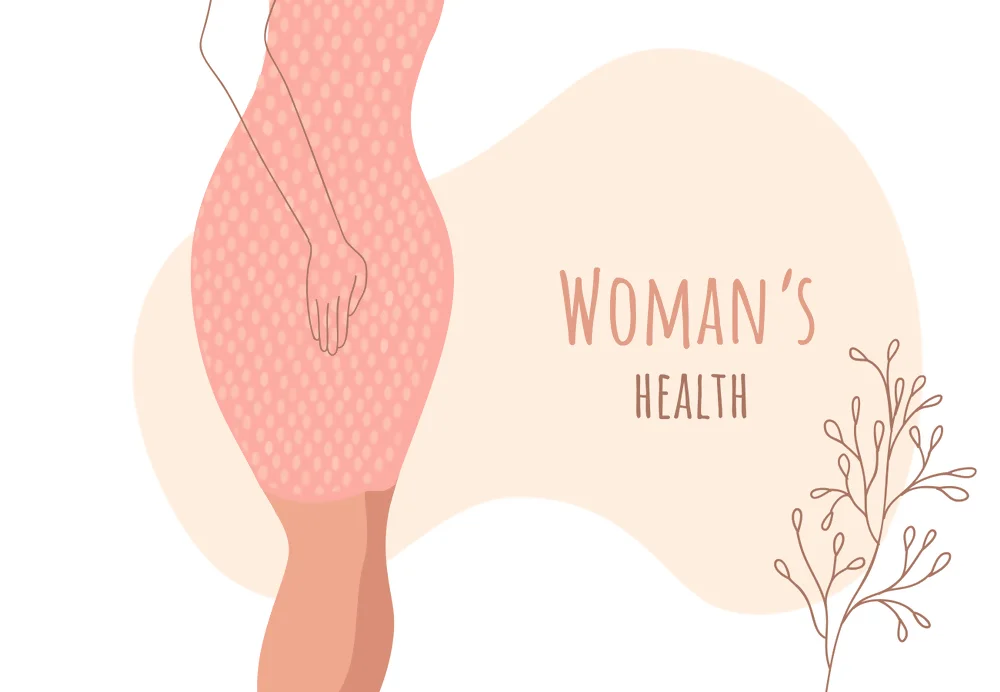
Sexual activity:
For many women, sexual function starts to decline around the age of 53. It’s possible that age-related or organic factors are to fault. A naturopathic doctor may help with a broad variety of sexual dysfunction issues, including hormone replacement therapy and testosterone replacement therapy.
Weight gain or loss, slowed metabolism:
Women’s metabolism slows down during menopause, which may lead to weight gain because of emotional eating. A naturopath may offer their patients natural medications, detox treatments, and dietary changes to help them lose weight and improve their metabolism.
Lab Tests
We provide different types of lab tests
which can help you to understand what is
happening to your body.
Health Programs
We offer numerous programs,
all dedicated to helping you lead a
healthier lifestyle.




